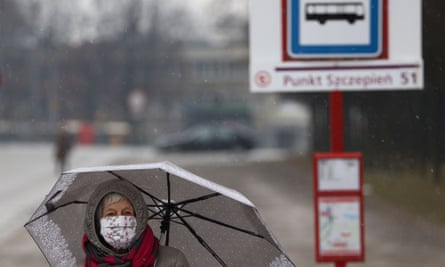Several European countries are extending or reintroducing lockdown measures as a third wave of the pandemic sweeps the continent fuelled by more contagious new variants of coronavirus such as the B117 mutation first detected in the UK.
Critics say the further restrictions have come too late, with politicians eager to start easing measures for pandemic-weary populations after a second series of lockdowns late last year leading to a surge in infections and health services stretched to breaking point.
The variant first found in Britain is spreading significantly in at least 27 European countries and is now dominant in Denmark, Italy, Ireland, Germany, France, the Netherlands, Spain and Portugal, according to the World Health Organization.
Up to 50% more transmissible than the original virus, it may also be more deadly. “The spread of the variants is driving the increase,” Hans Kluge, the WHO’s Europe director, said last week. “But so is the opening of society when it is not done in a safe and a controlled manner.”
Germany 2.6m cases, 75,000 deaths
After reopening schools in late February and allowing hairdressers and some shops to resume business in March, Germany is to prolong its partial lockdown into April as new cases surge to more than 13,000 a day on a rolling seven-day average.
Chancellor Angela Merkel met leaders of the country’s 16 states on Monday for what were supposed to be talks about a further easing of restrictions, but instead agreed a pause to the planned reopening of bars, restaurants, leisure and cultural venues.
Some hard-hit areas may have to reimpose strict measures again, with shops and some schools very likely to close. Staff who can work from home will be asked to continue doing so until 18 April rather than return to the workplace on 28 March.
Private gatherings are again expected to be limited to no more than one person from outside the household, excluding children under 14. Discussions about the closure of schools and nurseries, as well as a possible lifting of restrictions over Easter, continued.
The weekly infection rate has increased to 107 per 100,000, up from the mid-60s three weeks ago, prompting authorities for the first time to consider overnight curfews in highly infected areas, as well as quarantine for people returning to Germany.
“Without significant restrictions, the number of new infections will increase to the point that the health system risks being overwhelmed by April,” a draft document read. “Given the current infection dynamics, forceful action is still required.”
France 4.3m cases, 92,300 deaths
France’s labour minister, Elisabeth Borne, became the fifth member of Emmanuel Macron’s cabinet – besides the president – to test positive for Covid-19 as the seven-day average of new daily cases exceeded 30,000, up from 10,000 in December.
The prime minister, Jean Castex, last week reimposed a partial “lockdown lite” on 16 départements – including the greater Paris region – that are home to roughly a third of the country’s population, closing non-essential shops are and banning inter-regional travel.
There are more people in intensive care in the Paris region than during the second wave in November, with hospital capacity now saturated.
Lasting for at least four weeks, the measures are less strict than previous lockdowns and some experts have questioned whether they will be sufficient. Hairdressers, bookshops and florists can stay open and people are allowed to exercise outdoors as often as they like during the day within 10km (6 miles) of their home.
France’s night-time curfew now begins at 7pm rather than 6pm, schools remain open (although senior high-school education revert to a hybrid half-at-home, half-at-school schedule) and all employees who can work at home are required to do so.
A study by the Pasteur Institute this month showed contamination at work accounted for 15% of new cases. “We are adopting a third way, a way that should allow us to rein in the pandemic without locking people up,” Castex said.
Italy 3.4m cases, 104,942 deaths
New daily cases in Italy have surged from a weekly average of just over 12,000 in January to more than 22,000 this week as a result of new variants, prompting the prime minister, Mario Draghi, to impose tough new restrictions from 15 March.
More than half the country – including Milan and Rome – – is already under the new regime, which placed any region with more than 250 cases per 100,000 automatically in the “red” category, meaning bars, restaurants and schools must close.
The whole country will be categorised as red during the Easter holiday weekend from 3 to 5 April, with people required to stay at home except for work, health or other essential reasons. Parents, children and teachers have protested the closures.
Italy has registered more than 105,000 coronavirus deaths since last February, the second-highest toll in Europe after Britain and the seventh-highest in the world. There 27,500 people with Covid-19 in Italy’s hospital at the weekend of which 3,500 were in intensive care.

Greece 238,800 cases, 7,500 deaths
Greece’s health minister has requisitioned private-sector doctors from certain specialties in and around Athens to help fight the latest surge in infections that is straining public hospitals to their limits.
Vassilis Kikilias said appeals for private doctors to volunteer to help in the public sector had not produced results, so he was ordering specialists in pathology, pneumonology and general medicine to help.
Greece has experiencing a major surge in infections despite strict measures being in force since early November, but nonetheless lifted some restrictions last week as part of a plan to gradually reopen the economy and relieve national fatigue.
Hair and beauty salons and archaeological sites opened on Monday and a nationwide night-time curfew will start two hours later, at 9pm, during weekends. Non-essential shops, restaurants and schools remain closed, however.
Athens accounts for roughly half of new Covid cases detected in Greece each day, which have soared to a weekly average of about 2,400 from 450 in late January.
Netherlands 1.2m cases, 16,280 deaths
The Dutch prime minister, Mark Rutte, a fortnight ago extended the country’s tough coronavirus lockdown until the end of the month as its seven-day average of daily new cases continued to surge, nearly doubling to about 6,400 from just over 3,000 in January.
Rutte, whose VVD party finished a comfortable first in national elections last week, has suggested a “tipping point is coming when more will be possible” – but local media reports suggest no further relaxation will be until at least the middle of next month.
A 9pm to 4.30am curfew remains in force, people are asked to avoid all but unavoidable foreign travel. Secondary schools may now open for at least one day a week and hairdressers and other “contact professions” are back at work.
People with an advance appointment are also now allowed to visit non-essential shops, which were closed since mid-December – but only with an advance appointment. Bars and restaurants remain shut.

Poland 2.07m cases, 49,365 deaths
Poland closed most public venues this weekend for at least three weeks as infections continued to climb rapidly, nearly quadrupling to an average of about 21,000 new cases a day from just over 5,000 in early February.
The health minister, Adam Niedzielski, said last week the main reasons for the surge was “the British mutation of the coronavirus”. The country began tightening restrictions two weeks ago, starting with just two regions, as its third wave increased.
But nationwide measures were unavoidable to stop the health system from being overwhelmed, Niedzielski said. Shopping malls are now closed except for essential stores like groceries or pharmacies.
Cinemas, theatres and other cultural venues are also shut, as are hotels, ski slopes, fitness centres and swimming pools, while the country’s entire education system has returned to online learning and home working is strongly recommended.
The government has said further restrictions, such as curfews, could become necessary if the measures do not prove enough. “The next steps will be a typical lockdown, where we will close everything completely,” Niedzielski said.
